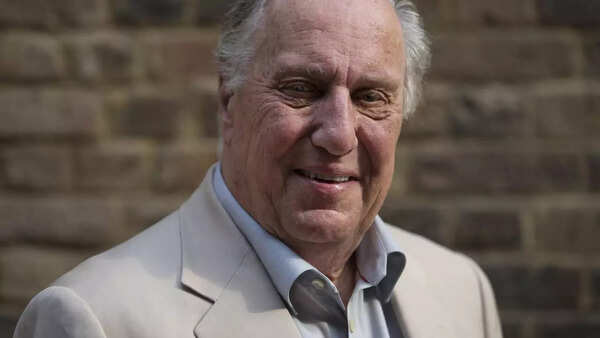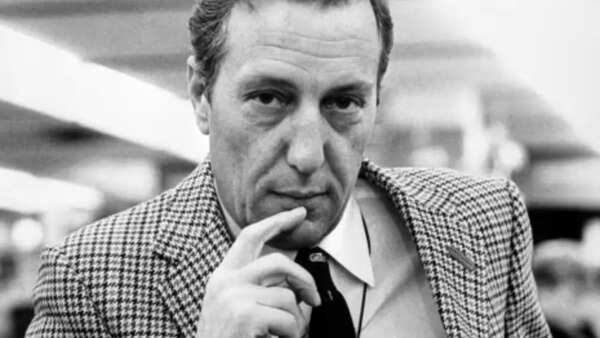Frederick Forsyth, the acclaimed British author who turned his adventures as a journalist and work with MI6 into bestselling thrillers, has died after a brief illness at the age of 86.Although his first book as an author was The Biafra Story, which came to fruition because he wasn’t allowed to cover the Nigerian Civil War between Biafra and Nigeria as a BBC correspondent due to the organization’s ‘policy’. As Forsyth “smelt news management,” he quit his job at the BBC, flew out there, stayed there for most of the next two years, and ended up writing The Biafra Story as a freelance journalist and budding author.However, it was The Day of the Jackal, his first full-length novel, that he finished writing in 35 days, that propelled him to achieve unparalleled success and recognition.

But as Forsyth had admitted on multiple occasions, he was not even interested in writing or becoming a writer. As a boy, he said, he wanted to be “a fighter jock,” and when he traded his career in the RAF for journalism, it was “to see the world” as a foreign and war correspondent. As for becoming a novelist, he confessed, “I never wanted to be a writer,” but wrote his first full-length novel, The Day of the Jackal, because he was “skint, stony broke.“Turns out, Forsyth’s stint with writing was not born out of some artistic aspiration, but more of a financial need. However, that financial need drove him to write his debut novel, The Day of the Jackal, in just 35 days, which went on to become a masterpiece and a bestseller.
From war zones to the typewriter:
In 1969, Forsyth returned to London after covering the Biafran War for Reuters and the BBC. At 31, he was financially strained, with “no job, no prospects, no flat, no car, no savings,” and seeking a quick way to clear his debts.

Desperate to make money, he “hit on the most no-hope-in-hell way of making some: write a novel.” Drawing inspiration from his journalistic experiences, he decided to write a political thriller. As per the author himself, “I just sat down and wrote about the invisible assassin with no name. I knew my material; I had walked every inch of it. I wrote night and day for 35 days.”The result was The Day of the Jackal, a novel about an unnamed assassin hired by the OAS to kill French President Charles de Gaulle. Forsyth completed the manuscript in just 35 days, using a portable typewriter, as the novel witnessed a storyline packed with full of operational details and putting fictional characters cheek by jowl with public figures, which brought a new realism to the thriller genre.
A realist’s approach to fiction:
The Day of the Jackal is based on rumors and a real-life assassination attempt plot against French President Charles de Gaulle. The novel focuses on a professional assassin, known only as the Jackal, who is hired to kill de Gaulle. The plot is a fictionalized account of a plan that was allegedly hatched by the Organisation de l’Armée Secrète (OAS), a French dissident paramilitary group, to assassinate de Gaulle in the summer of 1963. While the novel incorporates elements of actual events and the OAS’s activities, the specific assassination plot and the Jackal’s actions are fictional.
Forsyth’s journalistic background deeply influenced his writing style. Call it a professional hazard or a boon, he applied similar meticulous research techniques to those used in journalism. He employed a documentary-like approach to storytelling, focusing on authenticity and detail. This realism set his work apart from other thrillers of the time, which often leaned heavily on imagination. Forsyth’s commitment to realism was evident in his portrayal of the assassin’s meticulous planning and the subsequent manhunt, which mirrored real-life investigative procedures.
From rejected manuscript to worldwide bestseller:
Despite its compelling narrative, Forsyth faced multiple rejections from publishers who doubted the commercial viability of a fictional account of de Gaulle’s assassination and the story of the novel itself, which involved a fictional OAS-hired assassin targeting de Gaulle. They argued that since de Gaulle had survived multiple assassination attempts and was alive when the book was written, the plot lacked suspense.
Forsyth persisted, eventually securing a deal with Hutchinson & Co. The novel was serialized in the London Evening Standard and Haaretz, gaining significant attention. Upon its full release in 1971, The Day of the Jackal became an international bestseller and was adapted into a film, released two years later.
The legacy of the storyteller
Forsyth’s debut novel not only launched his career but also set a new standard for the political thriller genre. His emphasis on realism and detailed storytelling influenced a generation of writers, including Robert Ludlum and Tom Clancy.Forsyth continued to write bestsellers such as The Odessa File, The Dogs of War, and The Fourth Protocol, solidifying his reputation as a master of suspense and intrigue.
From an enthusiastic journalist to an acclaimed novelist – while living a life of an MI6 spy in between – Forsyth’s journey is a testament to wielding the power of real-world experience in crafting compelling fiction. His ability to translate the complexities of international conflict and espionage into gripping narratives has left an indelible mark on the literary world.The Day of the Jackal remains a testament to his skill, discipline, and unwavering commitment to authenticity, even after over half a century since it was first published.


